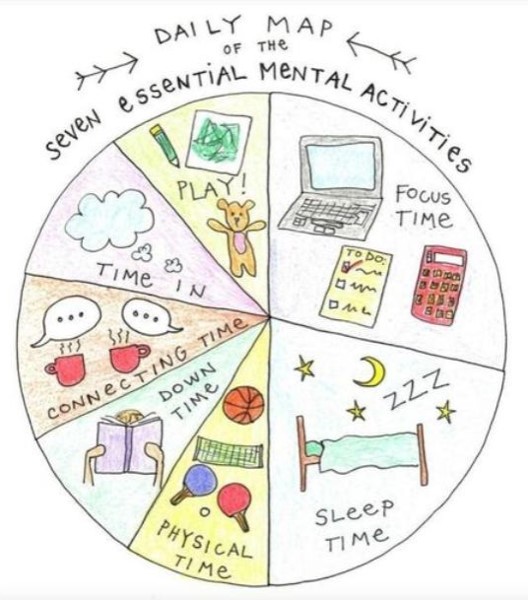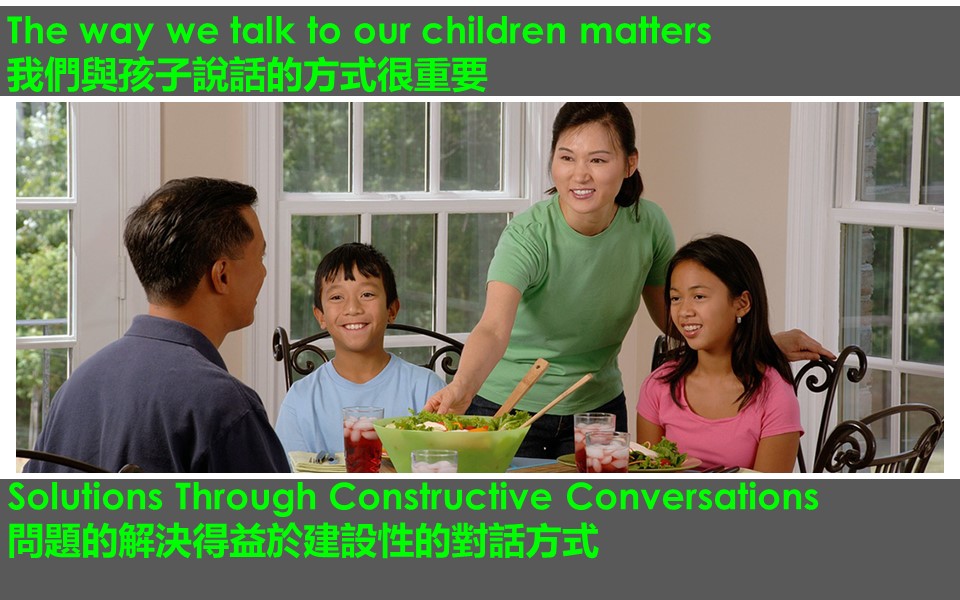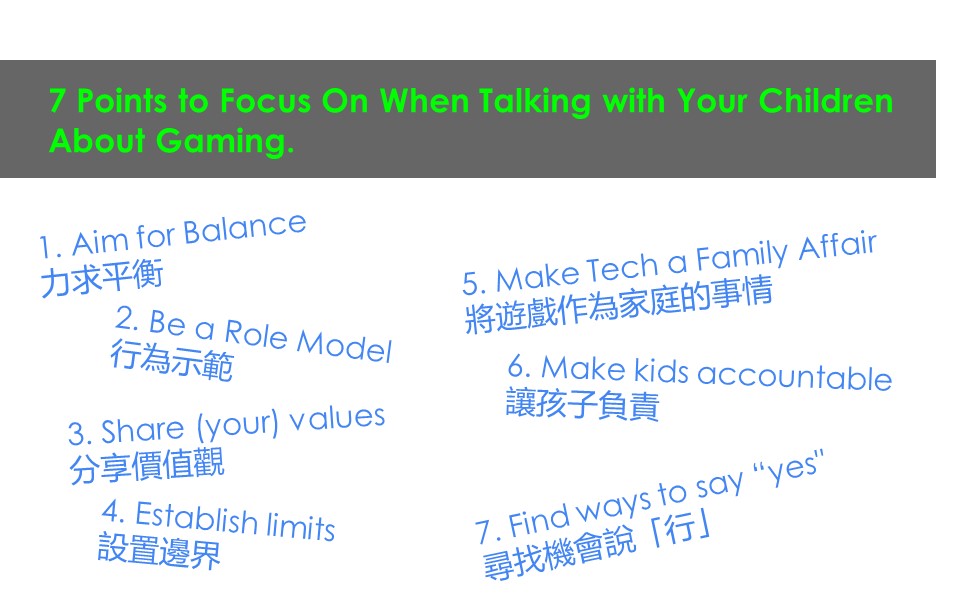This article looks at technology, gaming, children, and how to have productive conversations with your children, and set limits.
You can view our presentation on this topic below.
Parents often express concern about technology and their children, especially excessive gaming and social media. It is important for you to educate yourself on this topic to help you and your children develop good habits and set reasonable expectations. By educating yourself, you will be equipped to have effective conversations with your children that will lead to positive outcomes.
This article explores common questions parents have about gaming, such as:
- Why do children like gaming?
- What are the good and bad of gaming?
- What strategies are there for parents to help children establish healthy habits?
To begin, we need to establish a few pieces of information.
Who Our Children Are
It is important to understand the context of our children, who they are, and the world in which they are growing.
You may notice that young children reach out to a TV or computer and try to control it through touch. This is because they were born in a world filled with iPhones, iPads, and apps. Because of this, our children are sometimes called the iGeneration. However, their actual name is Generation Alpha (Wikipedia).
Generation Alpha are children born between 2010 and 2025, with the oldest children now being about 10 years old. They are the first generation born entirely in the 21st century. They, like their older siblings, are characterized as:
- being social,
- using mobile technology,
- are global in their worldview while being comfortable with digital technology,
- and prefer visual media.
They find digital entertainment and media fun.
What is a Growth Mindset?

For our discussion, we follow a fact-based, research-based approach using information from developmental psychology, research, and educational theories.
We can positively influence our children’s growth and development if we focus on and support their efforts and struggles, even if they fail and make mistakes, instead of only praising and focusing on their successes (i.e. grades). This is suggested by the growth mindset theory developed by Carol Dweck (Learning Theories) and her research on developmental psychology.
This is a view that everyone’s talents, habits, and behaviors can be developed through hard work, good strategies, and input from others. A famous example from Ms. Dweck’s research showed a long-term positive impact on children’s development by focusing on their effort instead of praising the end results. She recommends you say, “That was a good effort!” instead of saying, “Well done, you got a good grade!”
What is a Balanced Life?

Co-founder of the NeuroLeadership Institute, Dr. David Rock, says just like the healthy food pyramid, there is a Healthy Mind Platter. He continues, ‘just as our brain needs proper food, he suggests these seven activities are important to strengthen the inner connections and development of our brain.’
We need:
- Focus time – the time when we focus on goal-oriented tasks; for our children this is often their schoolwork.
- Sleep – which helps the brain consolidate learning and recover from the day’s activities.
- Physical time – the time we spend moving our bodies. In school, our PE classes often support this.
- Downtime – when we are not focused, with no goal in mind, and let our mind wander or simply relax to recharge our brain.
- Connecting time – the time we spend connecting with other people, ideally in person, such as over dinner. Unfortunately, these days, we often have to do this virtually.
- Time In – when we quietly reflect internally on our feelings & thoughts.
- Play – for both adults and children, this is the unstructured and self-directed time when we are creative, enjoy new experiences, and get to engage in things we are interested in.
Being positively engaged in your child’s life and well-informed with good information will have a positive impact on his or her growth and development. This includes setting rules and boundaries and finding fun and balance in life.

Why Children Play Games

There are many reasons people play games.
- They are stimulating and fun.
- They connect with friends when playin
- Their friends are playing the same game, so they feel like they are part of a community.
- Gaming allows children to feel a degree of control/freedom because they choose what they play and how they play the game.
- Gaming is shown to release pressure and stress.
- They feel challenged and feel rewarded when they find solutions or solve problems.
Numerous studies have been conducted demonstrating gaming has a positive impact on reading and language acquisition, supports the development of problem-solving skills, improves hand-eye coordination, and helps develop memory skills.
In summary, gaming supports social and emotional needs while positively impacting growth and development.
Parents’ Concerns: Information on Games Children are Playing
There are new games that capture the excitement and interest of children appearing all the time. What is popular today will be replaced with something new in six months. Understanding what your children are interested in playing will help you understand why they want to play them and will help you guide them to play appropriate games for their age.
There are many websites available to help parents to learn about the games their children are playing.
- Common Sense Media’s game review (this is our go-to site for many parent resources)
- Ask about Games
- Pluggedin: Focus on the Family
These websites provide information on games that is straightforward and easy to understand. Understanding which games are OK for children to play is very similar to deciding which movies or TV shows they can watch.
We recommend that children not play first-person shooters or anything that depicts violence similar to what you see in a live-action movie. Games that encourage problem-solving or collaborative engagement with friends and peers are good for development and for maintaining friendships.
Aiming for Balance
Aligned with the balanced life diagram above outlining seven essential mental activities, the purpose of finding balance is to find time for relaxation, downtime, building connections, and play to offset all the hard work done and focus time. Some of these activities can be combined or achieved through a single activity. For example, playing with friends helps with both play and building connections.
When it comes to setting boundaries, your children look to you and learn from you. They learn from you and learn how to live their lives, so it is important to be a good role model for them and to be involved (PLAY: Psychologist Advice for Healthy Gaming).

Being a good role model includes showing how you balance your life. Show your children it is important to work and that it is equally important to play while demonstrating the importance of meeting our obligations and expectations. You will need to discuss and demonstrate this through regular and repeated conversations.
There is no single recipe for success when it comes to finding balance, especially when two people want different things. We recommend you have discussions on the following topics.
- To find balance, it helps to understand what you want and what your child wants. Ask your child the question, “Why do you want to do what you want?”
- How long are they allowed to play?
- Understanding that different games require different amounts of time will help you in your conversation with your child. Some can be played in 15 to 30 minutes, while others are more complex and require two or more hours to meet a goal.
- When is it appropriate to play?
- This time should be after getting your work done or meeting obligations, but there should be a time when it is OK to play.
- Where are they allowed to play?
- We recommend using the living room or a common room shared by all family members. We do not recommend that younger children play games in their bedrooms.

As noted above, there is no single or simple recipe for finding balance, and what this looks like for your family may be different from friends and other families. However, by engaging with your children and having a conversation with them that asks them for their thoughts, you will be on the right path to building a healthy and effective relationship with your children.
Sources & Resources
There are many resources for parents that can be trusted. The following were used for this article and are good resources for families to use when discussing gaming.
- eSafety Commissioner – Online Gaming
- The New York Times Smarter Living – How and When to Limit Kids’ Tech Use
- Common Sense Media – Presentations for Parents & Families
- Common Sense Media – Social Media, Gaming & Mental Health
- Internet Matters – Online Gaming Advice
- Iowa Reading Research Center: Parent-Child Conversation: More Than Just Idle Chatter
- kcParent: Tips for Inspiring Conversations with Your Kids